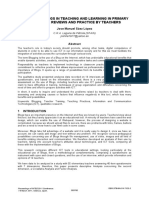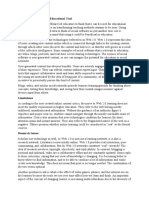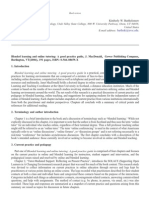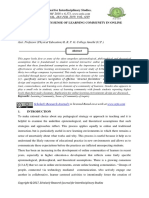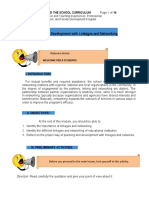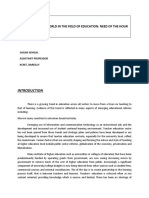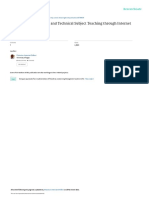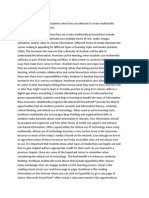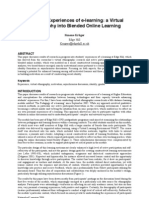Professional Documents
Culture Documents
Blogging As A Reflective Tool in Physiotherapy Ethics
Uploaded by
Michael RoweOriginal Title
Copyright
Available Formats
Share this document
Did you find this document useful?
Is this content inappropriate?
Report this DocumentCopyright:
Available Formats
Blogging As A Reflective Tool in Physiotherapy Ethics
Uploaded by
Michael RoweCopyright:
Available Formats
The use of blogging as a reflective tool in physiotherapy ethics
SAAHE conference, 2009
Context
The use of social software in higher education facilitates collaborative learning practices and mirrors the social
constructivist principles of education by encouraging deeper engagement with both content and individuals.
Reflection promotes higher order cognitive skills that promote critical thinking, and together with ethical
reasoning has been shown to contribute to professional development and clinical practice. A blog is a service
that allows a user to post ideas online, as well as to solicit feedback from others that serve to contribute to an
ongoing discussion. This allows for a rich, diverse stream of ideas that provide further input into the reflective
process.
Aims
The aim of this study is to evaluate the use of blogging as a tool for enhancing physiotherapy students' reflective
practice during an ethics module. By participating in an online, networked conversation on human rights in
healthcare, students will discuss some of the problems inherent in the South African healthcare system, as well
as recognise and acknowledge the different viewpoints of others.
What was done
A blogging environment was created to allow only students and the lecturer access to post, read and comment
on reflections. Articles relevant to the ethics module were provided for students to read and to inform their
reflections. They were required to read and comment on the reflections of their peers, facilitating an ongoing
conversation around the topic. On completion of the assignment, students will be asked to evaluate the process.
Impact
With the move towards a more networked society and the increasing use of online tools in education and
practice, educators must take cognizance of new approaches to teaching and learning. The use of blogging as a
tool for reflective practice has shown positive results in other disciplines but has not been evaluated in
physiotherapy education.
Take home message
Blogging as a tool for reflection brings advantages to the process of professional development that are not easily
leveraged with any other medium. The characteristics of the platform allow for collaborative discussion,
immediate feedback and encourages deeper engagement with the content, all of which facilitate more
meaningful interactions and stimulate professional development.
You might also like
- The Use of Blogs in Teaching and LearninDocument9 pagesThe Use of Blogs in Teaching and Learnin76lunaluNo ratings yet
- Social Networking As An Educational ToolDocument4 pagesSocial Networking As An Educational Toolİsa ArslanNo ratings yet
- From Leadership in School Organization to Pragmatic Research in Physical Education Professional DevelopmentFrom EverandFrom Leadership in School Organization to Pragmatic Research in Physical Education Professional DevelopmentNo ratings yet
- Using Blogs To Enhance Critical Reflection and Community of PracticeDocument11 pagesUsing Blogs To Enhance Critical Reflection and Community of PracticeShalini RamNo ratings yet
- Assignment 4Document6 pagesAssignment 4Dreana MarshallNo ratings yet
- Peter Rennert-Ariev - PD Framework For Online TeachingDocument6 pagesPeter Rennert-Ariev - PD Framework For Online TeachingClassroom 2.0 BookNo ratings yet
- Journal Review Translation and Interpetataion: Name: Sofia Uswatunisa NIM: 11810420712 Hp/EmailDocument4 pagesJournal Review Translation and Interpetataion: Name: Sofia Uswatunisa NIM: 11810420712 Hp/EmailDede HarissantosoNo ratings yet
- Role of Mentoring in Librarianship: ShiftDocument4 pagesRole of Mentoring in Librarianship: ShiftNil MukherjeeNo ratings yet
- A Learning and Teaching Model Using Project-Based Learning (PBL) On The Web To Promote Cooperative LearningDocument9 pagesA Learning and Teaching Model Using Project-Based Learning (PBL) On The Web To Promote Cooperative LearningNenden Nur AeniNo ratings yet
- Online Courses Require Multiple Instructional StrategiesDocument50 pagesOnline Courses Require Multiple Instructional StrategiesMarynel ZaragosaNo ratings yet
- Reflection Paper WilsonDocument18 pagesReflection Paper Wilsonapi-396723513No ratings yet
- Jurnal PBLDocument4 pagesJurnal PBLFeri Dwi HartantoNo ratings yet
- Abstract (SAAHE) - Social Networks To Develop Practice KnowledgeDocument1 pageAbstract (SAAHE) - Social Networks To Develop Practice KnowledgeMichael RoweNo ratings yet
- Assessment Strategydocv2Document12 pagesAssessment Strategydocv2api-357627068No ratings yet
- Action Research ProjectDocument16 pagesAction Research Projectapi-454423663No ratings yet
- Educ 639 Wiki Literature Review Lord DavidDocument33 pagesEduc 639 Wiki Literature Review Lord Davidapi-273216977No ratings yet
- Blended Learning MiniCourse 3Document4 pagesBlended Learning MiniCourse 3Tamir SassonNo ratings yet
- Constructivism Based Blended Learning in Higher EducationDocument112 pagesConstructivism Based Blended Learning in Higher EducationHectorDiazNo ratings yet
- Omde 610 Learning Journal Summer 2013Document49 pagesOmde 610 Learning Journal Summer 2013api-126824830No ratings yet
- Ed Admin Class Asst 5dDocument5 pagesEd Admin Class Asst 5dJefferson IsraelNo ratings yet
- A Study of Students Sense of Learning Community in Online EnvironmentsDocument16 pagesA Study of Students Sense of Learning Community in Online EnvironmentsAnonymous CwJeBCAXpNo ratings yet
- Ped 9 Content Module 11Document14 pagesPed 9 Content Module 11Arline Hinampas BSED-2204FNo ratings yet
- The Impact of Study Lesson Towards Esl Learners Malaysia PerspectiveDocument8 pagesThe Impact of Study Lesson Towards Esl Learners Malaysia Perspectivefurqon andriNo ratings yet
- 6 Strategies Build Online Learning CommunityDocument2 pages6 Strategies Build Online Learning Communityjessica malatgNo ratings yet
- Understanding Instructional DesignDocument6 pagesUnderstanding Instructional Designapi-540238585No ratings yet
- Application of Social Software in College EducationDocument3 pagesApplication of Social Software in College EducationDejailson PinheiroNo ratings yet
- Six Ways to Boost Student Engagement in Online CoursesDocument5 pagesSix Ways to Boost Student Engagement in Online CoursesBernadeta AjengNo ratings yet
- Coutinho 2007Document5 pagesCoutinho 2007Lakshmi NairNo ratings yet
- BHC Faculty PTD October 1, 2010Document18 pagesBHC Faculty PTD October 1, 2010Mysweet PenNo ratings yet
- Using Social Media to Enhance Student EngagementDocument11 pagesUsing Social Media to Enhance Student EngagementMark Anthony AntonioNo ratings yet
- Teaching Philosophy Haseeb Ali FinalDocument3 pagesTeaching Philosophy Haseeb Ali Finalapi-367130953No ratings yet
- Role of Digital WorldDocument5 pagesRole of Digital WorldSAGARNo ratings yet
- The Role and Responsibility of The Learner in The Online ClassroomDocument4 pagesThe Role and Responsibility of The Learner in The Online Classroomapi-295665506No ratings yet
- Critique On Online Chat Higher Education - EditedDocument7 pagesCritique On Online Chat Higher Education - EditedAllan DavisNo ratings yet
- Online Teachng StrategiesDocument2 pagesOnline Teachng Strategiesrex.egonio.jrNo ratings yet
- Reflection of Professional Development SessionDocument5 pagesReflection of Professional Development Sessionapi-611404867No ratings yet
- Pedagogical Approaches and Technical Subject Teach PDFDocument15 pagesPedagogical Approaches and Technical Subject Teach PDFMaheshwor PokhrelNo ratings yet
- Learning Team Aet562 - Self-Guided Social Media Training ManualDocument18 pagesLearning Team Aet562 - Self-Guided Social Media Training Manualapi-646128900No ratings yet
- Faulkner Educ 570 2Document10 pagesFaulkner Educ 570 2api-279207053No ratings yet
- Training for Trainers: A Guide to Designing Interactive Trainings Using Popular Education TechniquesDocument44 pagesTraining for Trainers: A Guide to Designing Interactive Trainings Using Popular Education TechniquesCheri HoNo ratings yet
- Teaching Ethics Through Social MediaDocument16 pagesTeaching Ethics Through Social MediaRemelyn PelicanoNo ratings yet
- Assessing With BlogsDocument5 pagesAssessing With Blogsapi-104812951No ratings yet
- Literature Review - Distance Education 1Document4 pagesLiterature Review - Distance Education 1api-217315843No ratings yet
- Towards Productive Reflective Practice in MicroteachingDocument25 pagesTowards Productive Reflective Practice in MicroteachingEzzah SyahirahNo ratings yet
- Nonlinear MultimediaDocument4 pagesNonlinear Multimediaapi-235241405100% (1)
- Review of Related Literature About Beauty SalonDocument7 pagesReview of Related Literature About Beauty Salonafmzaxfmrdaame100% (1)
- Global Education CourseDocument6 pagesGlobal Education CourseElena BaldeaNo ratings yet
- Actionable Learning A Handbook For Capacity Building Through Case Based LearningDocument528 pagesActionable Learning A Handbook For Capacity Building Through Case Based LearningtoltecayotlNo ratings yet
- Facilitator HandbookDocument40 pagesFacilitator Handbookatmmmmmmmmy100% (1)
- Literature Review On The Role of School Guidance and CounsellingDocument7 pagesLiterature Review On The Role of School Guidance and Counsellingluwop1gagos3No ratings yet
- Online LearningDocument11 pagesOnline LearningSteven WaruwuNo ratings yet
- Author Who Will Be The Primary ContactDocument13 pagesAuthor Who Will Be The Primary ContactPeter FormanNo ratings yet
- 8 Learning Communities and Support - v3 - en-USDocument9 pages8 Learning Communities and Support - v3 - en-USRafelly113No ratings yet
- Eac 586 NarrativeDocument1 pageEac 586 Narrativeapi-241121673No ratings yet
- Students' Experiences of E-LearningDocument8 pagesStudents' Experiences of E-LearningMofreh AminNo ratings yet
- Final Project-Course EvalDocument19 pagesFinal Project-Course Evalapi-485411718No ratings yet
- Supporting Participants in Web-Based Collaborative Learning Activities From A Holistic Point of View: A Tale of Seven Online and Blended CoursesDocument28 pagesSupporting Participants in Web-Based Collaborative Learning Activities From A Holistic Point of View: A Tale of Seven Online and Blended CoursesreymertaNo ratings yet
- Welcome To International Journal of Engineering Research and Development (IJERD)Document5 pagesWelcome To International Journal of Engineering Research and Development (IJERD)IJERDNo ratings yet
- Reaserch Ethics Training PDFDocument210 pagesReaserch Ethics Training PDFJasiz Philipe OmbuguNo ratings yet
- Active Learning in An Undergraduate Setting - Reflections, Key Learning and RecommendationsDocument7 pagesActive Learning in An Undergraduate Setting - Reflections, Key Learning and RecommendationsEloisa BretañaNo ratings yet
- Social Networks in Clinical Education Poster (SAAHE)Document1 pageSocial Networks in Clinical Education Poster (SAAHE)Michael RoweNo ratings yet
- Poster Handout For Social Network ProjectDocument1 pagePoster Handout For Social Network ProjectMichael RoweNo ratings yet
- Social Networks and Practice Knowlege (WCPT Abstract)Document2 pagesSocial Networks and Practice Knowlege (WCPT Abstract)Michael RoweNo ratings yet
- Abstract - Bringing Human Rights Into Focus in Medical EducationDocument2 pagesAbstract - Bringing Human Rights Into Focus in Medical EducationMichael RoweNo ratings yet
- Abstract - The Use of ICT by SA Physio StudentsDocument1 pageAbstract - The Use of ICT by SA Physio StudentsMichael RoweNo ratings yet
- Personal Learning Environments (Abstract)Document1 pagePersonal Learning Environments (Abstract)Michael RoweNo ratings yet
- Abstract - PHD Proposal (M Rowe)Document1 pageAbstract - PHD Proposal (M Rowe)Michael RoweNo ratings yet
